Dell Studio 14z: Thin and Light Done Right
by Jarred Walton on October 20, 2009 3:00 AM EST- Posted in
- Laptops
Battery Life without Killing Graphics
We run many scenarios for our battery life tests. Since most the 14z doesn't include an internal optical drive, we will focus on DivX HD, x264 HD, Internet, and idle battery life. The GeForce 9400M definitely helps in video playback with complex H.264 codecs. We measured CPU utilization for both 720p and 1080p x264 videos and Windows Media Player Home Cinema; the maximum CPU usage for 1080p was only 12%, and average CPU use was just over 5% for both 720p and 1080p. Interestingly enough, 720p DivX decoding actually required slightly more CPU time (8.5%).
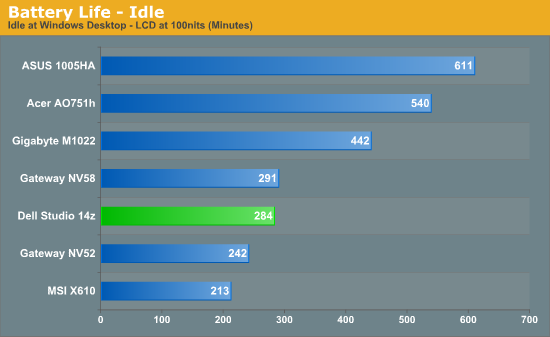
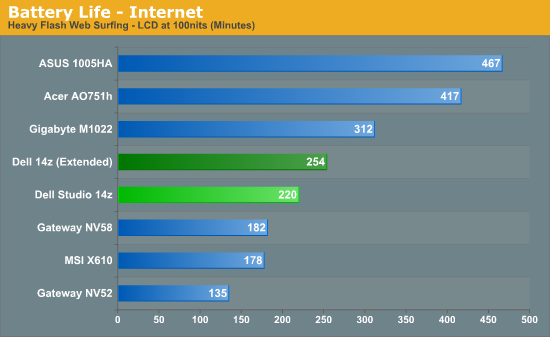
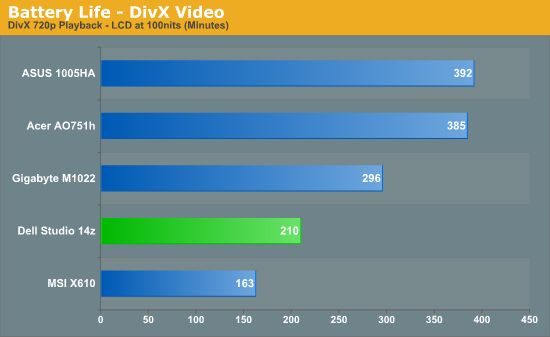
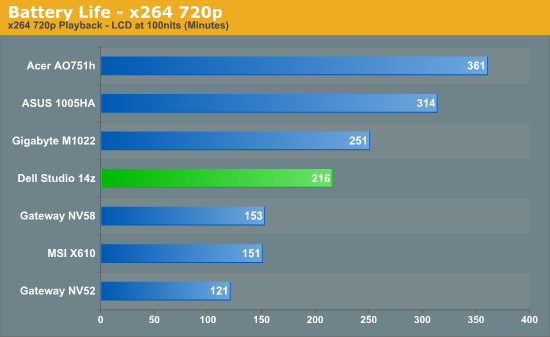
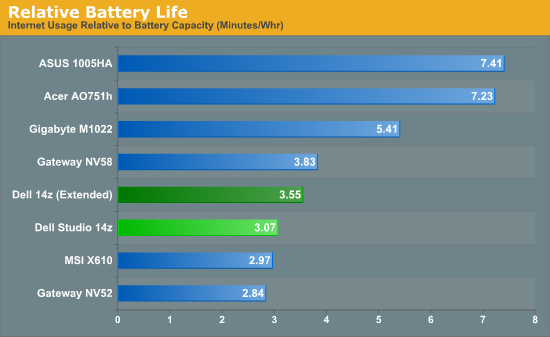
Compared to other laptops, the Studio 14z delivers reasonable battery life. However, we are using the larger 8-cell battery (71.6Wh/74Wh), and even in our idle test we didn't come anywhere near the 6.5 hours of battery life Dell lists on their website using the default power settings. In order to get to 6.5 hours, you need to enable the "Dell Extended Battery Life" option, which switches to the "Power Saver" profile, disables the Glass UI, and makes a few other tweaks.
It looks like the Studio 14z should offer comparable battery life to the standard MacBook, at least with the 8-cell battery, but that means the MacBook is making better use of its 60Wh battery. The MacBook Pro remains out of reach of similarly equipped Windows laptops (for now). The Studio 14z does extremely well in the Internet and x264 decoding tests, where it beats the Gateway NV58 by over 20% and 40% respectively. The Gateway NV58 has a smaller battery, however, and in relative battery life the NV58 still outperforms the 14z in Internet tests.
Incidentally, battery life while gaming remains acceptable: we were able to run 3DMark06 in a loop for just over three hours (188 minutes), with essentially the same performance as we achieved on AC power. Even with the smaller 56Wh battery, users should still be able to get over two hours of gaming, just shy of three hours of Internet surfing (depending on web site complexity), or about 2.5 hours of HD video playback. That's not as good as the standard MacBook (3.1 hours of video playback and web surfing on a 45Wh battery), but it's no longer a complete blowout.
Power Requirements
As a corollary to the battery life tests, we also performed measurements of power requirements using the AC adapters and a Kill-A-Watt device. These numbers are only accurate to the nearest Watt, so a difference of 1W (i.e. from rounding) could obscure up to a 12% actual difference in power requirements. Also note that power requirements change when you switch to DC power, and power supply (power brick) efficiency comes into play when using the AC adapter, so the battery life tests are a better indication of true power requirements.
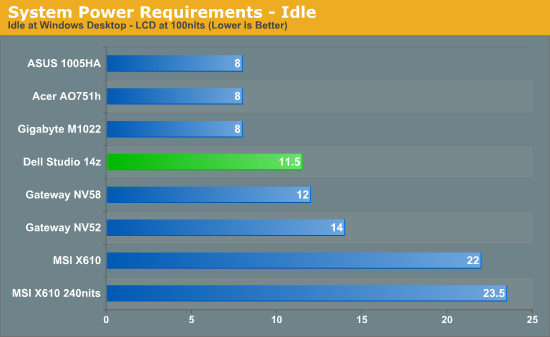
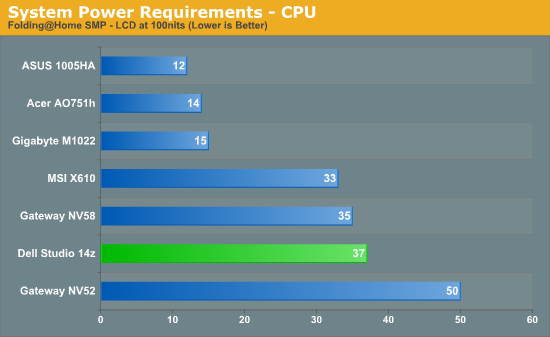
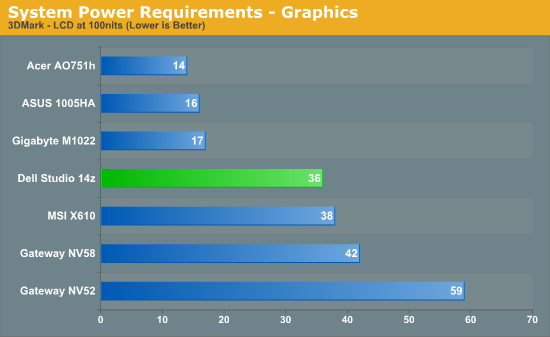
The Studio 14z has impressive idle power requirements, coming in just below the NV58. When we put a load on the CPU, however, the lower clock speed on the T6500 in the NV58 puts it back in the lead. Worth noting is that the T6500 has a TDP of 35W compared to 25W for the P8600, but all indications are that it actually doesn't use as much power. TDP isn't a true measurement of power requirements!? Say it isn't so…. Perhaps more interesting is that in our simulated gaming test (3DMark at native LCD resolution), the Studio 14z ends up using less power than any of the other laptops. It's still a far cry away from the netbooks, but it's nice that users can get what appears to be the best current IGP solution without compromising on power requirements.










57 Comments
View All Comments
Shadowmaster625 - Thursday, October 22, 2009 - link
Newegg has a notebook for $399 right now. Please explain how you justify twice the price. A slightly faster processor, slightly more battery life. Big whoop.JarredWalton - Thursday, October 22, 2009 - link
It helps to link to what you're talking about, or at least mention the name. Let's assume you're looking at the http://www.newegg.com/Product/Product.aspx?Item=N8...">Acer Aspire AS5517-5671, which currently sells for $400.1) 15.6" vs. 14.0"
2) 6.0 lbs. vs. 4.6 lbs.
3) AMD Athlon 64 TF-20 (1.6GHz) vs. Core 2 Duo P8600 (2.4GHz)
4) DDR2 vs. DDR3
5) 160GB HDD vs. 320GB HDD
6) "Up to" 2.4 hours vs. 4.5 hours (measured)
When you combine all of those areas, plus chassis design, the Studio 14z is clearly superior to this particular $400 laptop in every way. Does that mean it's worth the extra money? You'll have to decide that. Keep in mind that the Gateway NV52 (benchmarked in this article) is going to be at least 30% faster CPU than the $400 Acer (2.1GHz vs. 1.6GHz), and the 14z with P8600 is almost twice as fast.
If all you need is a basic laptop and you want to save money, sure, go for a cheap $400-$500 laptop. Don't expect top performance or battery life, and you won't be disappointed. Unfortunately, don't expect top quality either (but it's possible you'll still get a notebook that doesn't have any issues).
JimmyJimmington - Friday, October 23, 2009 - link
Also a different GPU, no wireless N, no blue tooth, no esata, no 1600x900 resolution screen.My question would be, if all you care about is saving money, why not go with a $150 netbook refurb? It would certainly be lighter and have more battery life. And if you drop it and it breaks you don't have to feel so bad because you can just go out and buy a new one :D
hybrid2d4x4 - Thursday, October 22, 2009 - link
Thanks for the excellent review, Jarred. I really like how you included the POST times, calling out Dell on glossy finish+screen and LCD quality and also adding FPS bars at the native res. One minor request for future reviews of laptops that are obviously unable to handle top-end games: throw in a Source-based game (or some other older engine) for comparison to show what the cutoff seems to be for what kind of game it actually CAN play well with med/high settings at the native res.On the POST issue, I wonder if there's something about the GF9400 that makes it POST slowly. My Gigabyte 9400-based mobo takes around 10s as well. I know it's not a vendor-specific issue since a Dell Mini 9 I've had my hands on did it in probably under 5s and booted to XP desktop in exactly 25s (8B SSD, uninstalled factory bloatware). I wonder if the Zotac and Asus 9400 boards also POST slowly...
jasperjones - Wednesday, October 21, 2009 - link
very nice review. the comparison you make to the macbook is well-balanced. and i agree that it is a viable--although more expensive--alternative.macs tend to be a good deal shortly after their model refresh (since apple tends to keep prices fixed until the next refresh). my problem with macs is that i don't like os x. basically, i run linux or windows as my main os on a mac. given the hint in a comment that anand might review the new macbook, one thing i'd really like to see on anandtech would be benches and battery performance under operating systems other than os x (yeah, i know linux is gonna suck battery-wise but win 7 might be an interesting option).
Kishkumen - Wednesday, October 21, 2009 - link
If only it didn't have a glossy screen (or rather had a matte option) I'd be the proud owner of one of these otherwise cool, little laptops....Pirks - Tuesday, October 20, 2009 - link
You were putting MacBooks there always, in the relative battery life graphs, but now you don't? Did you get enough hate mail from wintrolls or what? Death threats maybe? ;)Also, do you intend to do a review of the new $999 MacBook they just released? Mighty sweet machine, could you touch it up and pass your thoughts you know? I'd be VERY interested, thanks!
JarredWalton - Tuesday, October 20, 2009 - link
Honestly, I removed the Mac from the graphs more because I know that the testing wasn't entirely Apples to apples. Different browser and web pages mean the Mac may have gotten a boost. Still, when a MacBook can last 3.1 hours with a 45Wh battery on our heaviest load (downloading files, playing a movie, and surfing the web) while a Windows laptop with similar specs can only get 4.5 hours at idle using a 74Wh battery, it's clear that OS X remains better optimized.DominionSeraph - Wednesday, October 21, 2009 - link
I can't wrap my head around the MacBook run times under OS X. I mean, it ain't like there are magically more c and p states available under OS X. And in your OS Mobility roundup you ran Vista in Power Saving mode -- I know that on my desktop that locks my X2 5200+ into its lowest p-state. If that's applicable to the AMD laptops, then the differences can't be explained by Microsoft OS idle processes causing blips to full-throttle.Could you test the MacBook with a MS OS, locked to the lowest SpeedStep setting using RMClock (or the like)? And then try @ max undervolt whilst still locked at idle?
If max undervolt while locked to lowest frequency can't match OS X at stock settings, I think my head will explode.
JarredWalton - Wednesday, October 21, 2009 - link
I can ask Anand to give it a shot... I think he's working on some MacBook articles already so it's definitely something to investigate. But don't discount the possibility that Windows (especially Vista) is preventing the CPU (and peripherals) from entering minimum C-states for long periods of time. Windows seems to constantly "ping" HDDs and other devices to make sure they're still around or something. LOL